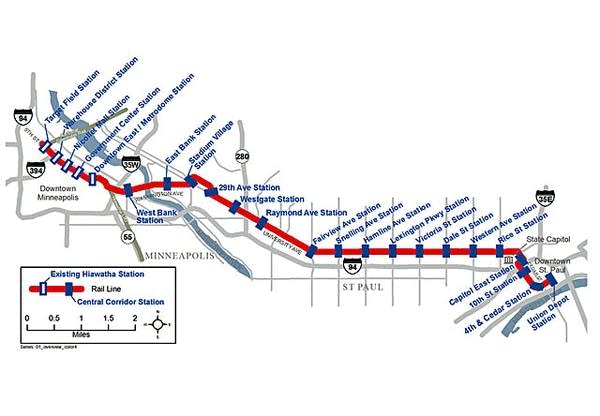Democrats say it's up to Pawlenty to revive rail money
Go Deeper.
Create an account or log in to save stories.
Like this?
Thanks for liking this story! We have added it to a list of your favorite stories.

DFL legislators, mayors, county commissioners and members of Congress are blasting Gov. Pawlenty for removing $70 million from the bonding bill for the Central Corridor light rail project.
The Republican governor used his line-item veto authority to remove a total of $208 million worth of projects from the bill.
Democrats' anger over the veto was crystal clear, but their plans to try to save the project were mostly fuzzy. St. Paul Mayor Chris Coleman said the fate of the Central Corridor now rests with the governor.

"There's one person that can resolve this. There's one person that can change the outcome for the Central Corridor. There's one person that has this project in their hands, and that's the governor," Coleman said.
Turn Up Your Support
MPR News helps you turn down the noise and build shared understanding. Turn up your support for this public resource and keep trusted journalism accessible to all.
"He either fixes this project or he kills it," Coleman continued. "It's not up to anybody else. The Legislature put that bill in his hands, and he chose to veto the Central Corridor."
Supporters say Minnesota stands to lose $450 million in federal funding if the state's share of the Central Corridor project isn't approved by September.
Some lawmakers are throwing up their hands, but others say they're still fighting. Rep. Michael Paymar, DFL-St. Paul, says he's looking for solutions.
"Nothing is dead until it's actually dead. And even then, projects can get on life support. And I don't think this project is dead," Paymar said. "He did open the door a little bit to some alternatives here, perhaps a supplemental bonding bill. I want to be optimistic about this. There's too much riding on this for the metropolitan area and the state of Minnesota."
Pawlenty did leave the door open, but he also set specific conditions.
"Nothing is dead until it's actually dead. And even then, projects can get on life support."
Pawlenty's spokesman Brian McClung says Central Corridor could still fit under the governor's $825 million limit for new bonding debt, along with two other key projects.
McClung says the governor still wants a nursing care facility at the Minneapolis Veterans Home, and the purchase of land for a state park at Lake Vermilion.
"We could be done with bonding this year. That would be fine by us. But if Democrats want to talk about taking care of Central Corridor or some other key state priorities, we're willing to listen to them," said McClung. "But we're going to expect them to show a little more fiscal discipline moving forward -- both in staying under the $825 million cap and in dealing with our state budget deficit."
A second bonding bill remains a possibility, or the projects could get rolled into end-of-session budget negotiations. House Republican Minority Leader Marty Seifert says he does not favor a second bonding bill.
"Obviously, you never rule anything out when these things happen. But the problem is once you start pulling the string off the sweater, everybody is going to come back. All 52 or 54 projects are going end up trying to come back in again," said Seifert. "And that's just not possible to happen."
A vote to override the governor's veto appears to be an even bigger longshot. But DFL House Speaker Margaret Anderson Kelliher wouldn't rule it out.
In the meantime, Kelliher says she's asking business leaders in Minneapolis and St. Paul to try to help convince Pawlenty to change his mind on the Central Corridor.
"I can't predict how or when the issue will resurface. But I would like to have the governor be an active participant in the request for that coming back on the negotiating table," said Kelliher.
Kelliher is also downplaying a second bonding bill this session. She says that bill would not have the built-in support from a wide range of projects throughout the state. A second bonding bill would also require a three-fifths majority to pass.
Lawmakers have until May 19 to finish their work for the 2008 session.



